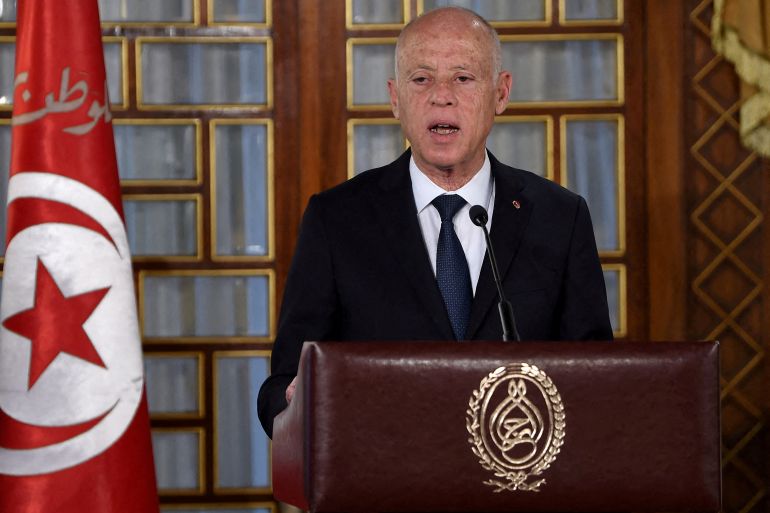Tunisian president names ally as new interior minister
Former Tunis governor Kamal Feki was given the post, days after mass opposition protests took place in the country.

Tunisian President Kais Saied has named Kamal Feki as his new interior minister, hours after Taoufik Charfeddine resigned from the post amid a crackdown on prominent opposition figures.
Saied issued two decrees on Friday, the first removing Charfeddine and a second appointing Feki, the former governor of Tunis, as head of the Ministry of Interior, the presidency said in a press release overnight.
Keep reading
list of 4 itemsWhat’s behind the violent racist attacks in Tunisia?
Trade union protests against Tunisia president after crackdown
African Union postpones Tunisia meeting after racist attacks
Feki, one of Saied’s staunchest supporters, refused to grant a protest permit to the opposition Salvation Front coalition, saying that its leaders were involved in plotting against state security. However, the Interior Ministry allowed them to protest.
A former lawyer, Charfeddine was a key figure in the election campaign that propelled the previously little-known Saied to the presidency in 2019.
He was seen as one of the closest Tunisian officials to the president but had in recent months appeared less frequently in public.
Speaking to reporters in comments broadcast on local media, Charfeddine referred to the death of his wife last year and his need to look after his children.
Saied has taken increasing control over security forces since July 2021 when he dismissed the government of the country’s former prime minister Hichem Mechichi. Saied shut down the parliament and moved to rule by decree before writing a new constitution that he passed last year.
Charfeddine had also served as interior minister under Mechichi, who sacked him in January 2021 as relations between the president and prime minister broke down. Saied reappointed him after dismissing Mechichi and seizing most powers.
Crackdown
Over recent weeks, Tunisian authorities have arrested prominent opposition figures who accuse Saied of a coup, charging them with conspiring against state security.
Police have also carried out a crackdown on African refugees lacking residence permits, with rights groups accusing them of detaining hundreds and turning a blind eye to racist attacks.
Last month, Charfeddine was at Saied’s side as Tunisia faced an international outcry over a tirade by the president against illegal refugees from sub-Saharan Africa.
“There is no question of allowing anyone in an illegal situation to stay in Tunisia,” the president said in one of his videotaped meetings with the minister.
“I will not allow the institutions of the state to be undermined or the demographic composition of Tunisia to be changed.”